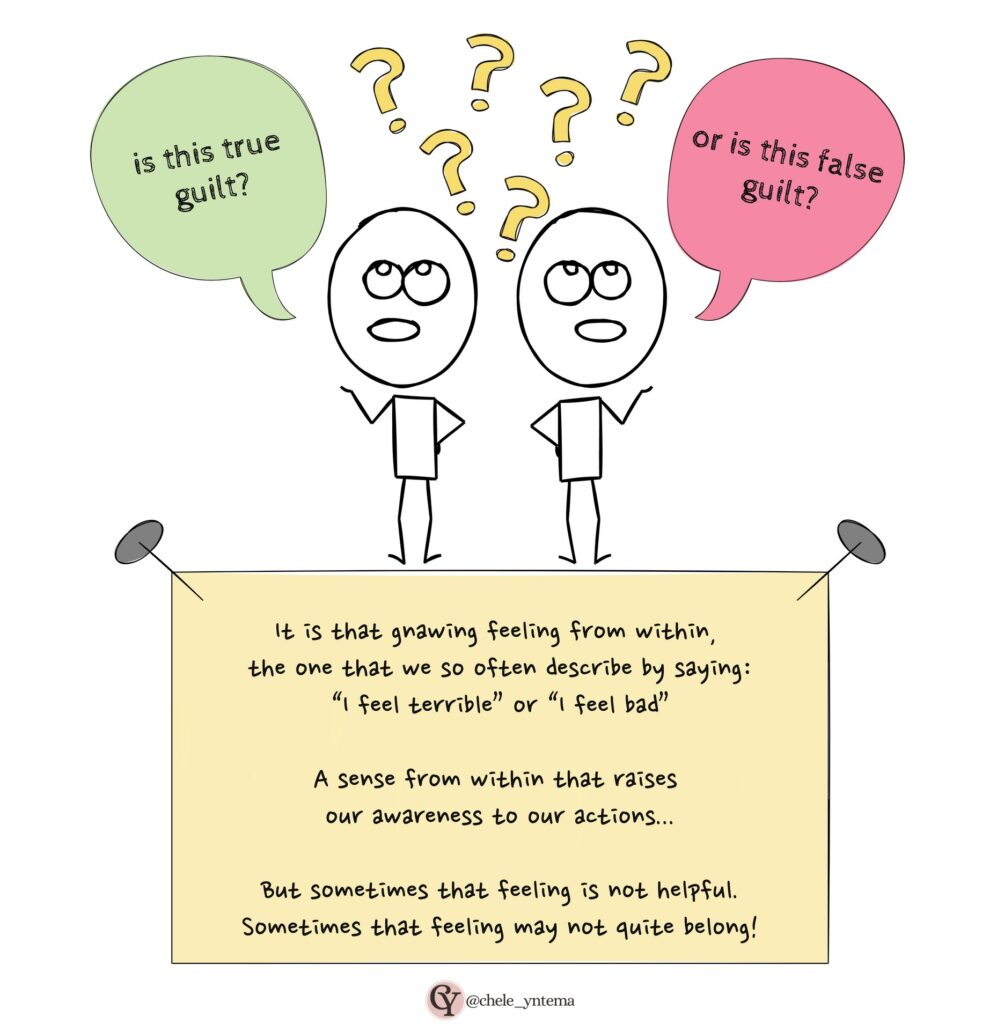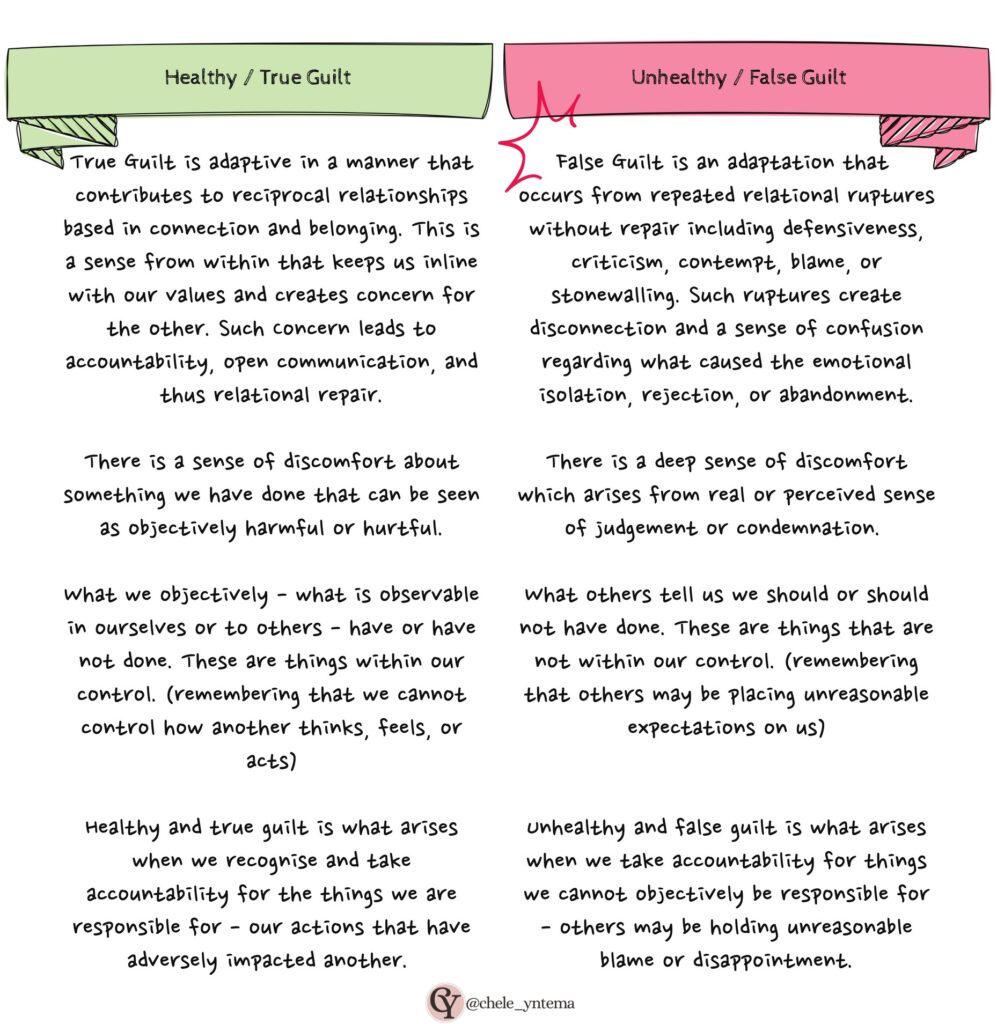Contents of Article
Think about a time you felt guilty. What made you feel this guilt? What impact did guilt have on you? How did you respond? Probably, your description of the cause starts with an ‘I….’.
This is because guilt is linked not with an external event, but with our own behaviour, a sense we’ve done something we shouldn’t, or not done something we should’ve. This makes guilt more complicated than some other emotions, because we have to have a sense of morality, a set of standards or values we believe we should live up to. We feel guilty when we sense a shortfall between our own behaviour and these standards or values..
Dr Lawrence Howells

Helpful (true) Guilt & Unhelpful (false) Guilt
It is that gnawing feeling from within, the one that we so often describe by saying “I feel terrible” or “I feel bad” ….
A sense from deep inside that raises our awareness to our actions – one may say it is the moral consciousness instilled in us from a young age, the internalised judgment that intends to let us know we have ‘transgressed’ against that which is valued.
Yet what happens when this internalised judgement we name guilt goes askew?
When healthy acknowledgement and accountability for transgression turns into condemnation and confusion between action and identity? What happens when “I feel bad” manifests into “I am bad”? What happens when an assessment of action turns into an assessment of human value?
What happens is a conflated sense of guilt and shame. Guilt that turns unhealthy and often then fuses to a sense of being ashamed of one’s actions.
These are the often blended parts of us that have internalised the guilting and shaming actions of others as we grew up; particularly if we grew up in worlds filled with rigid expectations, disapproval, blame, and fear for that which was beyond our control.
With this said, knowing the distinction between these two self-conscious emotions can help us to differentiate the two. This in turn can help us to see the parts of us that arise in certain relational situations and to know, with more certainty, what belongs – what is true of ourselves. With understanding and differentiation of emotions, particularly these self-conscious emotions, we can begin to feel more empowered through an embodied secure knowing that what we know to be true of ourselves can be trusted.
Primarily it is important to be aware that while guilt is a cognitively assessed feeling that holds a specific assessment of action as it relates to our moral beliefs and values, shame is an embodied and relational emotional experience that holds a global assessment of our value as a human. In other words, the parts of us that feel guilt can be seen as the parts of us that bring awareness to any actions that went against our sense of morality and/or had a negative impact on others. When healthy, it is this feeling of guilt that allows us to take accountability for the impact that our actions had on another. In other words, we are empowered by guilt to restore any relational ruptures that those actions cause.
Comparatively, the parts of us that feel shame are often the parts of us that hold a sense of being inadequate, fundamentally flawed, or without worth; when others use blaming-shaming tactics when we are young, parts of us begin to doubt our own autonomy and our authentic sense of Self. Younger parts that have repeatedly experienced shaming (identity based), rather than guilting (action based), may often feel a sense of disconnected vulnerability (disempowerment) when mistakes are made. These younger parts of us that feel disempowered are often subconsciously exiled as we begin to develop parts that begin to protect us from potential mistakes by using an internal dialogue of self-referential criticism and by taking on a disproportionate sense of responsibility for others.
It is essential to acknowledge that the parts of us that use this dialogue of self-referential reproach holds well intentioned purpose; this is a part of you that serves to predict and to protect you from further perceived failures and/or external perceived disapproval, disappointment, disparagement (disconnection). The part of you that holds a disproportionate sense of responsibility for others may serve protect you from feelings of helplessness or isolation (being alarmed and alone in that disconnection). It is important to remember that both parts are there to shield your authentic sense of Self from an Other’s harsh rejection and to maintain a sense of significance and belonging.
Another way to understand the ways guilt conflates with a sense of being ashamed is that, throughout our lifespan in times of vulnerability, we may have experienced excessive levels of relational disconnection caused by unattainable or rigid expectations, disproportionate disappointment, disapproval, disparagement, or unreasonable blame for that which was beyond our control. This creates the self-referential judgements and doubt that can begin to conflate and confuse a sense of responsibility and accountability for a transgression: guilt becomes unhelpful spiralling quickly into a cycle of shame.
In this cycle of shame we may sense our actions have created relational disconnect – there is conflict – parts of us perceive (or are told) that our actions have harmed an Other, a feeling of guilt begins to arise, we feel vulnerable and alone – what was the action that caused this sudden or severe disconnect? Parts of us feel overwhelmed by confusion, unsure what it was yet sure it was us that caused this. Parts want to interpret our actions as wrong or bad, they search inside of the mistake yet cannot grasp onto exactly what was done… Vulnerable parts begin to create subjective links where perhaps there were no objective links – parts begin to interpret the mistakes as ours and due to our alarmed aloneness, confusion and overwhelm leads us to the only conclusion parts can make sense of – it is our whole being that is at fault and faulty. Parts of us who were so vulnerable, who needed to know it was safe to make mistakes without being emotionally rejected or abandoned, were left alone to conclude that they are to blame, that this is their shame to bear.
Ouch! It is no wonder so many suffer in silence, confused and alone.
This is why I have chosen to elaborate on these important feelings of guilt – both those which are helpful and true, and those which are unhelpful and may be instigating spirals of shame. By differentiating the two forms of guilt it is my hopes to begin to help you to acknowledge what is true for you, and to begin to break free from this sense of false guilt. I do note however, in offering some practices that may assist you in the identification of the two forms of guilt, this particular post does not elaborate on the much deeper topic of shame.
Rather, this might be the first step toward an internal sense of knowing that which you are responsible and accountable for – helpful guilt – to know when unhelpful guilt shows up. Further, this differentiation can assist us in understanding why unhelpful guilt may show up and how it became an important protective part of you.
A Brief Summery of Healthy and Unhealthy Guilt

A little more about Helpful Guilt
True Guilt is adaptive in a manner that contributes to reciprocal relationships based in connection and belonging. It creates concern for the other that leads to communication and relational repair.
There is a sense of discomfort (an unpleasant moderate affect – may take on similar sensations to worry or concern) about something we have done that can be seen as objectively harmful or hurtful.
This is a helpful part of us that keeps us in line with our core values and beliefs; it helps us to be more active in taking accountability for, and learning from, our actions.
This helpful part calls us to pay attention to what is important to us, and to repair any ruptures that were caused in relationship.
Tied to realistic and developmentally appropriate expectations and responsibilities. True guilt takes accountability for our feelings, thoughts, and actions.
Accountability means knowing what we are responsible and accountable for.
- Knowing what is mine, and not mine.
- Paying attention to and understanding our own actions, thoughts, feelings, and underlying needs.
- Knowing that we cannot control other’s actions, thoughts, feelings, needs.
- Knowing we can communicate with compassion our needs by making requests, however others can choose not to fulfil those requests.
A little more about Unhelpful Guilt
False Guilt is an adaptation that occurs from repeated experiences of disconnection and isolation based in helplessness and/or blame (rejection/abandonment).
There are parts of us that feel discomfort (an unpleasant moderate/high affect – may take on similar sensations of anxiety, dread, or a ‘sinking feeling’) which arises from unrealistically high standards and expectations, or unreasonable demands and criticisms. Such standards, expectations, demands, or criticisms can be instigated externally by another or internally from within ourselves.
Parts that feel false guilt may be tied to fears of aggression, conflict, “trouble”, rejection and/or abandonment. These parts often take accountability for feelings, thoughts, or actions that are not our own.
Often the internal parts that hold the high standards and expectations, demands and criticisms developed in childhood to appease a caregiver (attachment figure). From a young age we internalise blaming/shaming actions to make sense of our Self, Others, and the World – this internalisation helps us to maintain a sense of safety and a sense of control in a world of chaos.
Parts that feel false guilt may be managing intense feelings of confusion, overwhelm, fear, and disconnection by making links where there may not be any.
The parts that feel false guilt may also be fused with parts that blame/shame and parts that feel ashamed (faulty, inadequate, damaged, unworthy, etc).
Breaking free from False Guilt
If there is a part of you that holds a sense of ongoing false guilt in relationships it may be that there is a need for clarity within your Self of your values and the virtues you want to, or do, live by. Knowing first, as an individual how you would like to be supported and how you would like to support the other, whilst also acknowledging how you would like to approach communication – particularly disagreement and conflict – can allow you to identify what both individuals are reasonably accountable for within the relationship.
This grounded Self clarity is particularly important if there is a trauma background. For example, you may notice that in disagreement or conflict confused and overwhelmed parts pop up; further to this you may also notice that in order to defuse certain situations and to remain connected (not rejected or abandoned) other parts of you may tend to capitulate and become agreeable.
With this in mind, you can begin to empower your Self by exploring the following ideas:
- What are some of my core virtues? What are the traits of Self that I want to live by?
(refer https://www.viacharacter.org/character-strengths https://cheleyntema.com/life-worth-living-potential-within/) - What do I value in relationship?
- What do I see are reasonable expectations in relationship? What are the non-negotiables (ie dignity, respect, physical and psychological safety)?
- What do these non-negotiables look like (ie we have a safe word or action and when either of us use the word we agree to take five minutes apart).
- How do I know (ie sensations in the body, feelings, thoughts) when these have been met or are not being met?
- What am I responsible for in relationship? And how do I take accountability for that? (ie I am responsible for my feelings, thoughts, and actions – if I am upset (frustrated, angry, scared, confused, overwhelmed, sad) I can communicate that in a manner that does not blame/shame the other person and I can remind myself that I am not responsible for another person’s feelings, thoughts, or actions).
- Am I aware of the power dynamics in relationships that can sometimes affect me? (ie personal power, role power, status power – see here for more information on power dynamics)
- Can I recognise my interpersonal tendencies or the parts of me that show up when I feel relational stress – for example is there a part of me that often takes on all the responsibility/accountability or blame/shame (ie what do parts of you think/feel and do when someone says “you are / you never / you always / you should…” as opposed to “when you … [something specific that hurt the other person]”
- Do I often take on responsibility for things within relationships that are not objectively a “mistake” – ask your Self, what actions where objectively hurtful, are the requests being made of me reasonable and realistic?
- Do I often feel like I need to prevent the other person from being disappointed; how does this person respond when they are feeling disappointed?
- You may ask your Self, is this objectively true or not true (ie what does my intuit say, do I agree with clarity that what this person is saying)? Is this about me or not about me (ie is it that I have broken an agreed upon boundary or have I gone against someone’s basic human right to personal dignity and safety = about me; or is it that the other person is deflecting or projecting something my way = not about me)?
- If it is not true, and not about me; if it is not true and about me; or if it is can I take a psychological step back and internally acknowledge that something is happening within the other person that is not within my control, and not something to take responsibility for? If I cannot is it that I am feeling scared of this person and need to step away in order to feel a sense of safety?
Compassionate Awareness is the key
Ultimately the key to breaking free from a false sense of guilt, or unhelpful guilt, is to know and understand more intimately the parts of you who first began feeling this sense within interpersonal interactions or within relationships. Perhaps these parts of you learned over time to attune to Other’s perceptions and interpretations of transgression and to respond in a manner that maintains the connection. Perhaps these parts of you internalised certain beliefs simply to make sense of Others and the World. Often these parts form when we are much younger and are dependent on our caregivers for survival. Such dependence can create a disorienting sense of ‘fear without solution’ and thus non-conscious internalisations that may be similar to:
- If I do not take responsibility, I will be rejected or abandoned.
- This person is scaring me with their aggression and so if I take responsibility, I can quickly defuse the situation and remain safe.
- If I pursue my needs, this person for whom I am responsible, will be hurt.
- The pursuit of my own positive personal goals is a transgression and so I must self-sacrifice in reparation.
As briefly aforementioned above, once we are aware of these different parts we can sense when they are present within us; we can then feel empowered to meet them with compassion and care; we can acknowledge that they show up in times of relational stress to protect us from what we fear may happen.
In spaces of reflection, or with your therapist, see if it feels safe to explore how these parts of you who hold the false guilt might be helping you. With this knowledge you may find it easier to know what is occurring in confusing or overwhelming relational interactions, and you may even be able to ask yourself “am I safe or not safe? is this true and helpful or not true and unhelpful? is this about me or not about me?”
Remember, sometimes even with the most effective understanding, if guilt has manifested or cycles down into shame, such understanding will not be sufficient. If you notice yourself within spirals of guilt-shame, connecting somatically is vital. You can access a few great connective meditations and further information about shame below, or connect with me should you wish to process how this has impacted your sense of Self more thoroughly.
Understanding Shame as Different to Guilt
 Welcome, my name is Chele, I am a therapist primarily specialising in Trauma – specifically as it presents as Burnout and Breakdown. As a psychotherapist & PACFA & CCAA Clinical Counsellor I work individually with beautiful humans such as yourself who feel alone, lost, confused, & overwhelmed; those of you who are longing for something different.
Welcome, my name is Chele, I am a therapist primarily specialising in Trauma – specifically as it presents as Burnout and Breakdown. As a psychotherapist & PACFA & CCAA Clinical Counsellor I work individually with beautiful humans such as yourself who feel alone, lost, confused, & overwhelmed; those of you who are longing for something different.
As such, I offer my knowledge, skills, and inherent gifts with ears that listen to hear, and a heart open to receive who you are, no matter the suffering you bring; to support you in an exploration of how your past has impacted you and the ways that shows up presently. Together we will rediscover your hope and your sense of Self; we will reconnect you to what matters reclaiming the joy and delight in life you so deserve.
I welcome you to view my services or connect with me to explore how I can assist you in your journey.

